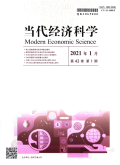当代经济科学2024,Vol.46Issue(4):1-13,13.DOI:10.20069/j.cnki.DJKX.202404001
数字经济驱动宏观经济治理体系完善的理论逻辑与政策实践
Theoretical Logic and Policy Practice of Digital Economy Driving the Improve-ment of Macroeconomic Governance System
摘要
Abstract
The research question of how the digital economy can effectively promote changes in the organizational and institutional arrangements of social production and empower the modernization of governance systems and capabilities at all levels holds significant research value.Currently,there is little research on the digital economy's role in driving macroeconomic governance changes.The digital sector and the physical sector are interconnected within the physical value chain and the innovation value chain,with unique exchange and competition relationships.In the macroeconomy,the digital sector is susceptible to output fluctuations during investment and financing exposure periods or industry cycle nodes,leading to broader economic fluctuations,which may render traditional macroeconomic control measures ineffective.The distinctive operational rules of the digital economy necessitate timely updates to macroeconomic governance and innovative implementation of macroeconomic policies in terms of ideas,methods,and means. This article uses Marx's theory of social reproduction as a foundation to construct a four-part reproduction model that includes digital production and its downstream sectors.It deduces the macroeconomic operation mode,policy tools,and governance system under the digital economy.The research findings include:1)Increased capital accumulation in the digital factor production sector drives growth in other sectors and overall output.2)Faster technological progress in the digital consumer goods production sector accelerates capital accumulation in the digital factor sector,promoting total output growth.3)Capital accumulation in the digital factor sector has a ratchet effect on total output growth,indicating that even a one-time increase in capital accumulation can continue to provide a positive supply shock to the macroeconomy.4)In the event of a negative demand shock,the digital factor sector increases research and development investment and accelerates technological breakthroughs to avoid a decline in profit margins,helping to maintain macroeconomic resilience and avoid drastic fluctuations in short-term total output.5)The relative exclusivity of the digital elements sector may weaken the policy effectiveness of expansionary demand management. The conclusion implies that in the digital economy,both initial demand shocks and demand policies aimed at rebalancing struggle to maximize short-term equilibrium changes.Therefore,macroeconomic rebalancing and long-term growth rely more on supply expansion or structured demand management policies combined with supply,and traditional regulatory measures would be partially ineffective.In recent years,China has implemented a series of institutional innovations in fiscal and monetary policies,coordinating with other policies,creating a new model for macroeconomic governance under the high-level socialist market economy system.This governance system fully considers the universal characteristics of the overall economic operation under the digital economy,aligning with the new characteristics of the macroeconomic rebalancing mechanism.It will continue to innovate and improve with the deepening development of the digital economy.Key points of this governance system include:1)Maximizing the high-energy growth potential of the digital economy,synergistically promoting the regulation of total demand and the improvement of supply quality.2)Unleashing the innovation-driven force of the digital economy,constructing a macro-resource mobilization,peak-adjustment,and allocation mechanism adapted to the cycle of digital technological innovations.3)Forming a macro-governance system where macroeconomic policy is closely coordinated with industrial,regional,and other policies.关键词
数字经济/宏观经济治理/社会再生产理论/资本积累/新质生产力Key words
digital economy/macroeconomic governance/theory of social reproduction/capital accumulation/new quality productive forces引用本文复制引用
刘航,高菲,马品..数字经济驱动宏观经济治理体系完善的理论逻辑与政策实践[J].当代经济科学,2024,46(4):1-13,13.基金项目
国家社会科学基金一般项目"基于资本规范健康发展的技术赶超领域产能过剩防范化解机制研究"(22BJY257) (22BJY257)
陕西省自然科学基础研究计划重点项目"共享制造新业态新模式对陕西制造业高质量发展的影响机制研究"(2021JZ-05) (2021JZ-05)
陕西省创新能力支撑计划项目"进口来源国基础研究投入对陕西工业高质量发展的溢出效应研究"(2021KRM039). (2021KRM039)

